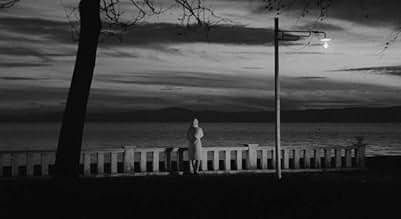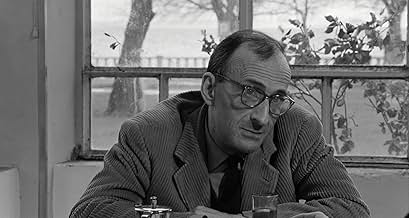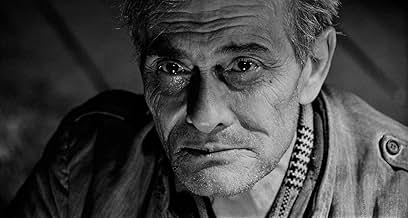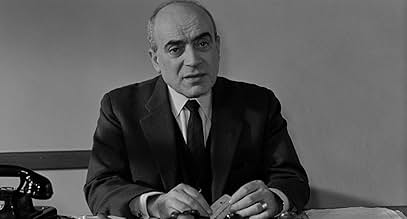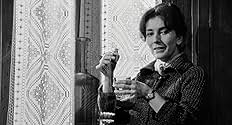IMDb रेटिंग
7.0/10
1.7 हज़ार
आपकी रेटिंग
अपनी भाषा में प्लॉट जोड़ेंWhile visiting his favorite resort town during the off-season, a novelist investigates the apparent suicide of a woman he was infatuated with.While visiting his favorite resort town during the off-season, a novelist investigates the apparent suicide of a woman he was infatuated with.While visiting his favorite resort town during the off-season, a novelist investigates the apparent suicide of a woman he was infatuated with.
Pia Lindström
- Adriana
- (as Pia Lindstrom)
Pier Giovanni Anchisi
- Francesco - Photographer
- (as Piero Anchisi)
Anna Maria Gherardi
- Servant Girl
- (as Anna Gherardi)
Jean Rougeul
- The Journalist
- (बिना क्रेडिट के)
फ़ीचर्ड समीक्षाएं
The famous writer Bernard (Peter Baldwin) travels to a small town nearby a lake to spend vacation out of season in the winter. He check in an old hotel owned by Enrico (Salvo Randone) and his daughter Irma (Valentina Cortese) expecting to meet the maid Tilde (Virna Lisi), from whom he had a crush last time he visited the town. However, he discovers that Tilde has committed suicide and when he meets the local photographer (Piero Anchisi), Bernard learns that she was pregnant. He becomes obsessed to find whether she really committed suicide and to guess what really happened. When Enrico's son Mario (Philippe Leroy) and his wife Adriana (Pia Lindstrom) arrive at the hotel, Bernard has daydreams about the fate of Tilde.
"La donna del lago", a.k.a. "The Lady of the Lake", is a dark and mysterious Italian film with a simple and inconclusive story. The black and white cinematography is magnificent, with great use of lighting and shadows. The cast is also excellent, supported by an intriguing screenplay with great narrative. Bernard's daydreams are interesting, showing what he is thinking and changing his reality many times. "La donna del lago" is for specific audiences that will certainly enjoy this type of story. My vote is seven.
Title (Brazil): "A Mulher do Lago" ("The Lady of the Lake")
"La donna del lago", a.k.a. "The Lady of the Lake", is a dark and mysterious Italian film with a simple and inconclusive story. The black and white cinematography is magnificent, with great use of lighting and shadows. The cast is also excellent, supported by an intriguing screenplay with great narrative. Bernard's daydreams are interesting, showing what he is thinking and changing his reality many times. "La donna del lago" is for specific audiences that will certainly enjoy this type of story. My vote is seven.
Title (Brazil): "A Mulher do Lago" ("The Lady of the Lake")
Glorious first film from Luigi Bazzoni, who would go on to make, The Fifth Cord and Footprints. Here with wonderful b/w cinematography from Barboni we have a straightforward enough, if noirish, beginning, gradually deepening into something resembling a gothic horror before developing before our very eyes into something more resembling a giallo. Always good to look at and with persuasive and involving dialogue, this engages from the start and although the tale is leisurely told, occasionally resembling Last Year At Marienbad, we never loose interest. Yet another near lost gem wonderfully restored thanks to Arrow. Oh and I almost forgot, we get a dreamy substantial cameo from the lovely Virna Lisi.
Fascinatingly dark and elusive, 'La Donna Del Lago' (aka) 'The Possessed' (1965) ominously remains a thrillingly enigmatic, majestically mysterious, almost impenetrable crypto-Giallo by the consistently excellent film stylist, Luigi Bazzoni, the prodigiously talented, intellectual auteur behind equally idiosyncratic, doom-laden, darkly dreamt anti-Gialli masterpiece, 'Footsteps on the Moon'(1975). Since 'La Donna Del Lago' was also written by fellow dramatic iconoclast, Gulio 'Death Laid an Egg' Questi, one might certainly expect to experience a similarly oblique tone, and in terms of starkly confounding genre conventions, skewed scrivener, Questi most certainly doesn't disappoint! While some might consider 'Lady of The Lake' to be just another indulgent example of overwrought nouvelle vague-esque cinematic doodling; but to blithely dismiss this eerily elegiac work as mere self-indulgence is, perhaps, to miss out of one of Italian genre cinema's most glacial,immaculately shot, singularly strange, wickedly off-key, noggin-scratchingly unique thrillers!
The Lady in the Lake is often seen as a precursor to the Giallo style that would reach it's peak in the early seventies; and I can certainly see why. However, I would say that the film is closer to a supernatural mystery film than a Giallo and it also shares a lot in common with the popular American film noir style; stemming from it's picture, execution and subject material. The film is very much of the high quality variety and director Luigi Bazzoni takes time and a lot of care to ensure that the film is haunting and mysterious as possible - which pays dividends as the plot starts to pan out. We focus on Bernard; a writer who goes to spend some time in a dilapidated hotel where he spent some time the previous year. Once he gets there, he begins searching for Tilde; a young maid he fell in love with during his previous visit, but he's surprised by the news that Tilde killed herself. However, it would appear that there is more to the apparent suicide as Bernard is shown a picture suggesting she was pregnant...
The film is directed by Luigi Bazzoni, who go on to make one of the best seventies Giallo's with the excellent The Fifth Cord as well as one of the oddest genre films with Footsteps in 1975. There's also a writer's credit for Death Laid an Egg writer-director Giulio Questi, so rather unsurprisingly - The Lady of the Lake is a rather bizarre film! It starts off simple enough and the first half of the movie is pretty easy viewing, but then things start to get a bit stranger in the second half and it becomes easy to loose the plot. It's lucky then that there's more than enough to keep the audience otherwise entertained. The cinematography is absolutely gorgeous and the black and white picture allows the director to capture a real macabre and moody atmosphere. The town in which the film takes place is a masterpiece within itself - the ghostly local population in particular is memorable. The plot comes back together towards the end and the film does give closure to its central plot line. Overall, The Lady of the Lake will probably not please all viewers; but it's a very well made mystery and anyone that considers themselves a fan of Italian cinema should check it out!
The film is directed by Luigi Bazzoni, who go on to make one of the best seventies Giallo's with the excellent The Fifth Cord as well as one of the oddest genre films with Footsteps in 1975. There's also a writer's credit for Death Laid an Egg writer-director Giulio Questi, so rather unsurprisingly - The Lady of the Lake is a rather bizarre film! It starts off simple enough and the first half of the movie is pretty easy viewing, but then things start to get a bit stranger in the second half and it becomes easy to loose the plot. It's lucky then that there's more than enough to keep the audience otherwise entertained. The cinematography is absolutely gorgeous and the black and white picture allows the director to capture a real macabre and moody atmosphere. The town in which the film takes place is a masterpiece within itself - the ghostly local population in particular is memorable. The plot comes back together towards the end and the film does give closure to its central plot line. Overall, The Lady of the Lake will probably not please all viewers; but it's a very well made mystery and anyone that considers themselves a fan of Italian cinema should check it out!
Having been very impressed by co-director Bazzoni's subsequent "The Fifth Cord", I have been very keen to see "The Lady of the Lake" since I first heard of it four or five years ago when i read Adrian Luther Smith's Excellent "Bloody and Black Lace" - a definitive collection of giallo reviews. It appears, under the title "The Possessed" in the obscure and rare titles section, along with a superlative review. Subsequent attempts to track the title down were in vain, until I popped into El Corte Ingles on my most recent Spanish holiday and found it on Filmax's "Giallo" collection under the title "El Mujer Del Lago". This is the only DVD outing I've ever heard of and there were both pros (a fantastic anamorphic print) and cons (it's Spanish and Italian only, with Spanish subs) - the cons apply as I'm an English speaker, but I was able to manage enough Spanish (with my dictionary at hand) to navigate through this beautiful, atmospheric film in Spanish with subs showing.
It's as good as it's advance word suggests - an ice cool, incredibly shot mood piece which emerges as a giallo only in hindsight, as at the time it was filmed, the concept hadn't been formed and we were still four years away from the giallo cycle proper which was initiated by the box office success of Argento's "The Bird with the Crystal Plummage" and Martino's "The Case of the Scorpion's Tail" amongst others.
The plot: A writer returns to the small town where he had vacationed previously. he's keen to meet up with his former maid, Tilde, with whom he had enjoyed a romance previously. However, she isn't there and the locals are not keen on talking about why. As he goes through the town, casual encounters build up an atmosphere of menace as everyone seems to be brushing her untimely death under the carpet. The writer presses on in his investigations, seeking the facts behind her death and finding an awful lot of problems lying beneath the town's impassive surface, but in doing so unleashes the pitch black heart of darkness that lies within this film's conclusion.
In terms of style, this is far away from the post-Argento iconography of the giallo. There are no black leather gloved killers here, no stalk and slash killings. All of the (physical) violence occurs off camera. But this remains one of the most claustrophobic, oppressive films of it's time. Much of the drama unfolds within the walls of the hotel, with flashbacks, fantasies and the present unfolding in this space. The film it feels most like is Renais' "Last year At marienbad", but with a more defined narrative. I suspect a lot of the time shifts come from co-screenwriter Gulio Questi, who would later return to the editing styles shown here in his own films such as "Django Kill... If you live, shoot!". Bazzoni contributes his unnerving eye for architecture as counterpoint and subtext to the story (he's on a par with Michael Mann in this respect).
This is a film about love, all types of love, from the casual to the obsessive, and the film gradually cranks up the tension until the conclusion. I hope that a wider audience will be able to embrance this with a DVD release from an outfit such as No Shame or Blue Underground. In the meantime, I'd advise anyone who cares about atmospheric horror/ thriller cinema to pick up the Spanish release, which can be had for a remarkable price (I paid 8.95).
It's as good as it's advance word suggests - an ice cool, incredibly shot mood piece which emerges as a giallo only in hindsight, as at the time it was filmed, the concept hadn't been formed and we were still four years away from the giallo cycle proper which was initiated by the box office success of Argento's "The Bird with the Crystal Plummage" and Martino's "The Case of the Scorpion's Tail" amongst others.
The plot: A writer returns to the small town where he had vacationed previously. he's keen to meet up with his former maid, Tilde, with whom he had enjoyed a romance previously. However, she isn't there and the locals are not keen on talking about why. As he goes through the town, casual encounters build up an atmosphere of menace as everyone seems to be brushing her untimely death under the carpet. The writer presses on in his investigations, seeking the facts behind her death and finding an awful lot of problems lying beneath the town's impassive surface, but in doing so unleashes the pitch black heart of darkness that lies within this film's conclusion.
In terms of style, this is far away from the post-Argento iconography of the giallo. There are no black leather gloved killers here, no stalk and slash killings. All of the (physical) violence occurs off camera. But this remains one of the most claustrophobic, oppressive films of it's time. Much of the drama unfolds within the walls of the hotel, with flashbacks, fantasies and the present unfolding in this space. The film it feels most like is Renais' "Last year At marienbad", but with a more defined narrative. I suspect a lot of the time shifts come from co-screenwriter Gulio Questi, who would later return to the editing styles shown here in his own films such as "Django Kill... If you live, shoot!". Bazzoni contributes his unnerving eye for architecture as counterpoint and subtext to the story (he's on a par with Michael Mann in this respect).
This is a film about love, all types of love, from the casual to the obsessive, and the film gradually cranks up the tension until the conclusion. I hope that a wider audience will be able to embrance this with a DVD release from an outfit such as No Shame or Blue Underground. In the meantime, I'd advise anyone who cares about atmospheric horror/ thriller cinema to pick up the Spanish release, which can be had for a remarkable price (I paid 8.95).
क्या आपको पता है
- कनेक्शनReferenced in The Legend of the Bazzoni Brothers (2019)
टॉप पसंद
रेटिंग देने के लिए साइन-इन करें और वैयक्तिकृत सुझावों के लिए वॉचलिस्ट करें
- How long is The Possessed?Alexa द्वारा संचालित
विवरण
- रिलीज़ की तारीख़
- कंट्री ऑफ़ ओरिजिन
- भाषा
- इस रूप में भी जाना जाता है
- The Possessed
- फ़िल्माने की जगहें
- Brunico, Bolzano, Trentino - Alto Adige, इटली(lakeside town: street views, shops, train station)
- उत्पादन कंपनियां
- IMDbPro पर और कंपनी क्रेडिट देखें
- चलने की अवधि
- 1 घं 25 मि(85 min)
- रंग
- ध्वनि मिश्रण
- पक्ष अनुपात
- 1.85 : 1
इस पेज में योगदान दें
किसी बदलाव का सुझाव दें या अनुपलब्ध कॉन्टेंट जोड़ें

